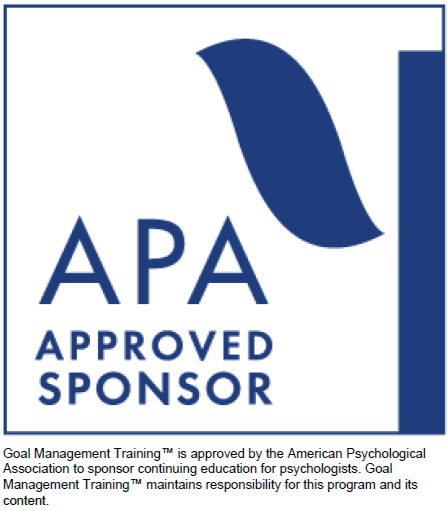GOAL MANAGEMENT TRAINING™
Read what therapists and clients are saying about GMT
Testimonials
Previous Trial Participants
“For me, the games modules were the most enjoyable. They provided practice and with the practice came a feeling of more accomplishment.”
“I thought the program was excellent. [My mentor] did a great job getting back to me if I had questions and also providing positive feedback for me. I enjoyed working with her very much”
“The program taught me strategies to help me manage my everyday life. It also challenged me to use thinking skills that stimulated my brain.”
“...brought it back to everyday use...relaxation techniques were helpful...hadn't realized how tightly I held my shoulders until I was forced to relax.”
“There were a great many things that I enjoyed including the homework and the practice aspect. I have really improved my deep breathing techniques since this program which has been helpful in many aspects.”
“Simply becoming aware of the "structure" of all that happens during a busy day instead of switching to automatic pilot and mindlessly plowing through things without stopping and refocusing. I think the refocusing aspect is the most important.”
“I didn't think it was possible, but it works!”
- In reference to reducing slips and automatic pilot by practicing breathing
“… the fundamentals and the execution of the program are excellent.”
“The techniques work...so I would say that's the best thing about the program.”
“…a useful tool for ageing persons but also for people in the workforce who are challenged with massive tasks on a daily basis.”
“The exercises were fun and kept me alert.”
“[The exercises and games] were definitely helpful, and I looked forward to doing them.”
Testimonials
2021 Trial Participants
Goal Management Training™
What are clinician-scientists saying about Goal Management Training?
Professor of Neuroscience & Psychology Director
Henry H. Wheeler Jr. Brain Imaging Center University of California, Berkeley
Executive functioning can be affected by a wide range of neuropathology such as traumatic brain injury, stroke and neoplasm, as well as a variety of other neurological or psychiatric conditions, resulting in cognitive deficits. Unfortunately, There are few therapeutic options for clinicians who treat patients with impaired executive functioning due to conditions such as traumatic brain injury, stroke, and tumours. Goal Management Training™ evolved from neuroscience research on frontal lobe function and has an outstanding evidence-based supporting its use. I am excited to hear about recent developments increasing accessibility of this valuable therapeutic program.
Associate Professor
Department of Psychology
Faculty of Health
York University
Higher cognitive (i.e. executive) functioning can be impacted in healthy aging, acquired brain injury and brain disease, so it is crucial to make effective, evidence-based, interventions for executive dysfunction as accessible as possible. Goal Management Training® is an exemplar of the cognitive rehabilitation neuroscience approach with tremendous evidence supporting its effectiveness, and is a tool we must deploy widely to help impaired individuals improve their cognitive function.
Associate Professor
Cognitive and Neuropsychology
University of Oslo
Goal Management Training™ is the leading intervention for executive functioning deficits, and its effectiveness as a cognitive rehabilitation program has been observed in many populations including in my own clinical research with cognitive impairment associated with depression, ADHD, acquired brain injury, spina bifida, and psychosis. The release of new online tools and training materials is a major development for patients suffering from cognitive impairment and the therapists training them.


